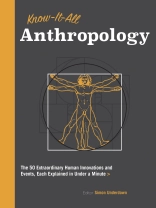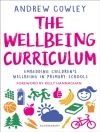Who are we? What is it about our species that sets us apart from every other living creature, past and present, on this planet?
These are perennially compelling questions about human evolution and development that continue to cudgel the best brains on earth
. Know-It-All Anthropology seeks to understand the roots of our common humanity, the diversity of cultures and world-views, and the organization of social relations and practices.
If you only have under a minute, that is enough time–by reading this book–to meet the ancestors and master the basic ideas, personalities, controversies, and future directions of the study of humankind.
The
Know It All takes a revolutionary approach to learning about the subjects you really feel you should understand but have never gotten around to studying. Each book selects a popular topic and dissects it into the 50 most significant ideas at its heart. Each idea, no matter how complex, is explained in 300 words and one picture, all digestible in under a minute.
Other titles in this series include:
Know It All Chemistry, Know It All Classical Music, Know It All Energy, Know It All Fashion, Know It All Great Inventions, Know It All Jazz, Know It All Medicine, Know It All Shakespeare, Know It All Whiskey, Know It All Wine, Space In 30 Seconds, Sports in 30 Seconds.
Om författaren
Editor Simon Underdown is Senior Lecturer in Biological Anthropology at Oxford Brookes University. He teaches, researches, and writes on human evolution, the effect of the environment on humans, palæoepidemeology, the relationship between biology and culture, and the development of human intelligence. He regularly appears on radio and TV programs , discussing human evolution and the latest developments. He writes for the Guardian on contemporary issues in science, including climate change, creationism, religious belief, and the use of human remains in research. He has also contributed book reviews to numerous publications, including History Today and the THES. A former Vice President of the Royal Anthropological Institute (2012–15) he was involved in designing the biological aspects of the A-Level in Anthropology. He is currently Chair of the Society for the Study of Human Biology and a Research Associate of the School of Anthropology and Museum Ethnography at the University of Oxford.












